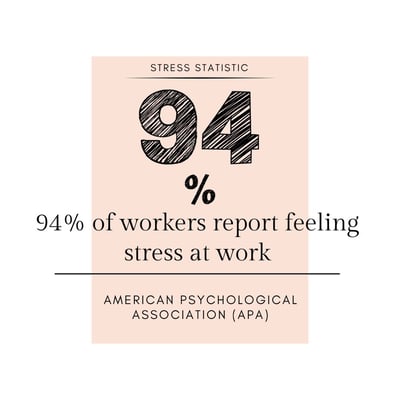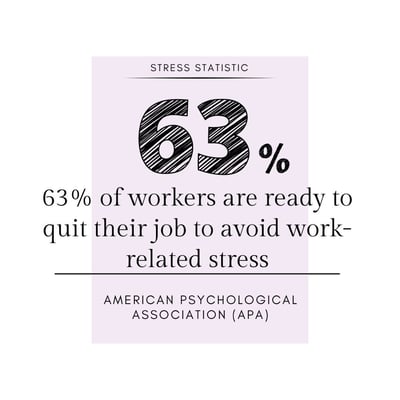Stress Therapy
Get relief Overwhelming Stress, Develop Coping Strategies, and reclaim your calm

Navigating Stress Through Therapy
We all know what stress feels like. You may have trouble sleeping, feel tension in the body, have racing thoughts, or a general sense of unease. Although everyone experiences stress at times, for some people it can have a serious impact on their lives.
Whether you're dealing with low-level, constant stress or you're grappling with extreme stress, it can affect your health as well as how you feel.
If you find yourself battling unrelenting stress, you can overcome it. Stress Therapy dives deep, unravels the core issues, and guides you to a calmer, more resilient self.

What Exactly is Stress?

Stress, a response to external triggers, can be momentary or persist over time. People tend to think of stress as an emotional reaction, but the truth is that most of what people experience as stress is physical.
The body's "fight or flight" mechanism, activates during stress, manifesting in physical symptoms. The challenge arises when the body frequently experiences stress in response to everyday events, disrupting the adaptive "fight or flight" response designed for life-threatening situations.
You might be wondering how stress differs from anxiety? Stress triggers various responses within the body, one of which is anxiety. It's important to note that anxiety is just one potential outcome of the body's reaction to stress, occurring within a complex feedback loop between the mind and body.
This distinction is crucial because stress signals from the body can lead to a range of other issues, including depression, burnout, trauma, medical conditions, or even a disconnection between the mind's awareness and bodily cues.
Recognizing Stress Symptoms
Am I showing signs of excessive stress?

1. Alarm
This stage is your body’s immediate response to stress. You might feel your heart race, your muscles tense, or your mind become extra alert. It’s common to feel anxious or uneasy as your body quickly prepares to face a challenge.

2. Resistance
If stress continues, your body works hard to cope and adapt. You may push through tiredness, have restless sleep, or struggle to focus. On the outside you seem to manage, but inside, the effort takes a toll.

3. Exhaustion
When stress goes on too long, your energy and resilience can wear down. You may feel deeply tired, less motivated, or emotionally drained. This is a sign your body and mind need rest and support.
Sources of Stress
Stress can arise from various factors, including demanding jobs, relationship issues, overscheduled lives, or significant life changes. Chronic stress, resulting from prolonged pressure, and acute stress, triggered by events like violence or illness, can both take a toll on mental and physical health. Identifying and managing stressors is crucial for overall well-being.
Stress occurs in everyone's life, but some people struggle with it more than others. Here are some factors that can make stress worse:
- Juggling too many responsibilities at home, work, or school
- Feeling isolated or lacking supportive relationships
- Past experiences or significant life events, like childhood experiences or trauma, impacting confidence and self-perception
- Managing several stressors at once or experiencing ongoing challenges
- Questioning your ability to handle difficult situations
- Coping with major life changes or unexpected events
Lets us Help you Find the Right Match
How Can Therapy Help With Stress?
Whether you're experiencing overwhelming, excessive levels of stress, or you just feel like stress is keeping you from living your best life, therapy can help. A trained therapist offers a structured and supportive environment to unravel the complexities of individual stress triggers.
They collaborates with clients to identify the root causes of stress, dissecting the emotional, psychological, and situational factors contributing to the overwhelming burden.
Through evidence-based techniques such as Acceptance & Commitment Therapy (ACT), Cognitive Behavioural Therapy (CBT) and Mindfulness-Based Stress Reduction (MBSR), clients gain a deeper understanding of their unique stressors, allowing for the development of tailored coping strategies.

Therapy empowers individuals to navigate life's challenges with greater adaptability, ultimately enhancing their overall well-being and ability to cope with stressors.
Therapy helps to disrupt unhealthy patterns entrenched by chronic stress. By fostering a reflective space, therapists assist individuals in shifting unhelpful thought patterns, enhancing present-moment awareness, and learning tools to navigate and reduce stressors with greater clarity and composure.
Impact of Stress on Health
It is possible for stress to be a part of a healthy life. Occasional, brief periods of stress can actually help you, spurring you to perform your best on a test or motivating you to prepare for a challenge. But when the stress is extreme or unrelenting, it can have a serious impact on your health.
According to the American Psychological Association, having high levels of stress hormones, such as cortisol, raises your risk of several conditions. It can contribute to depression, anxiety, lowered immune response, digestive problems, headaches, muscle pain, coronary disease, stroke, trouble sleeping, weight gain, memory loss, and concentration impairment. Stress also seems to cause inflammation in the circulatory system.
Living with chronic or extreme stress doesn't just feel bad; it's actually destructive.
Support Starts Here
Our compassionate therapists are equipped with various tools to help you manage stress effectively. You do not have to face stress alone.
FAQs
Therapy works best when the 'fit' is right with your therapist. That’s why we carefully match you with someone whose expertise fits your needs and preferences. Building a strong therapeutic relationship is key to creating a supportive and effective experience.
Before meeting your therapist, you’ll complete a brief intake form. Your first 50‑minute session focuses on what brings you in, your goals, relevant history, and what success would look like. We’ll explain confidentiality and co‑create a plan so you know what comes next. It’s normal to feel nervous—your therapist will guide the pace.
The frequency of sessions depends on your needs and goals. Many people start with weekly or bi-weekly appointments and adjust as they make progress. The total number of sessions is unique to you—your therapist will work with you to find the right approach.
We offer evidence-based therapies like CBT, which is often the starting point, and exposure-based techniques to help you face your fears in a safe and supportive way. Online CBT is also an option for many. Your care plan will be personalized to fit your goals and comfort level.
Most of our services are covered by extended health benefit plans. Coverage varies with every plan, so please check your specific plan or contact your provider to confirm your benefits.
Most employer benefits cover therapy with a Registered Social Worker (MSW, RSW) or a Registered Psychotherapist (RP). We can direct bill to most major insurers when your plan allows it; otherwise, we email insurance‑ready receipts after your session.

Last Reviewed May 27 2024 by Melanie Baker
Melanie is a Registered Social Worker with the OCSWSSW. She completed her Masters Degree in Social Work at Wilfrid Laurier University. Melanie is a neurodivergence-affirming therapist who blends warmth, humour, compassion, and a conversational style to help clients feel relaxed and comfortable. She deeply believes that no matter their background, the people she works with are adaptable, resourceful, and capable of the healing and change they’re seeking in their lives.
Not sure yet? Let’s talk it through.
If you’d like to ask questions or explore your options first, book a free 20-minute matching consult or give us a call (226-752-8857) . One of our team members will help you find the right therapist and next steps that feel comfortable for you.
%20(1).png?width=200&height=80&name=Trillium%20Counselling%20Logo%20(999%20x%20398%20px)%20(1).png)

















